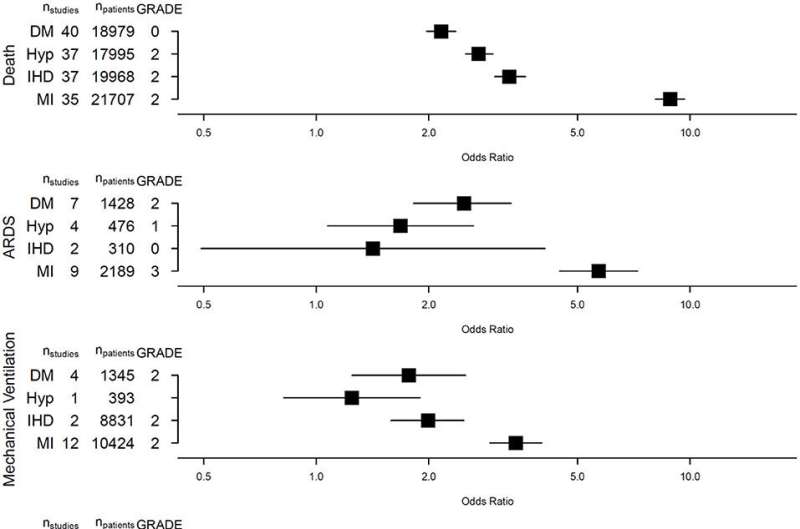Unvaccinated people with heart problems up to nine times more likely to die, suffer serious COVID-19 complications

Researchers from Queen Mary University of London have combined evidence from 110 previous COVID-19 studies and found that unvaccinated individuals who contract the virus when they already have high blood pressure, diabetes or major heart damage are up to nine times more likely to suffer serious outcomes—including death, lung failure, admission to intensive care and kidney problems.
The study, published in the journal Frontiers in Cardiovascular Medicine, looked at almost 49,000 unvaccinated patients in total, and identified multiple predictors of more severe COVID-19 and worse outcomes in them compared to vaccinated individuals. It found that evidence of heart muscle damage (myocardial injury) at the time of admission to hospital was associated with a nine-fold increase in likelihood of death. Patients found to have such heart issues also had higher chances of developing other complications, including severe lung failure (acute respiratory distress syndrome) and acute kidney injury, and required higher rates of intensive care admission and invasive mechanical ventilation.
The researchers also found that unvaccinated individuals with pre-existing high blood pressure, diabetes or heart artery disease had a two to three-fold increased risk of death, and up to 2.5-fold increased risk of other COVID-19 related complications. When comparing the three medical conditions, individuals with diabetes were at the highest risk of developing severe lung failure. Prior to the emergence of COVID-19, these conditions were already known to be common predictors of heart attack and stroke.
Dr. Ajay Gupta, study author and senior clinical lecturer at Queen Mary and honorary consultant in clinical pharmacology and cardiovascular medicine, said: "These findings present a strong case for these at-risk groups to be prioritized for vaccinations and other preventative measures. This is especially true in low and middle-income countries, where the impact of cardiovascular disease is particularly high.
"In more developed countries, groups with cardiovascular risk factors in addition to other vulnerable groups could be selected for booster and annual vaccination programs, similar to the influenza vaccination program."
Dr. Sher May Ng, one of the study authors from Barts Health NHS Trust said: "These findings can help us identify unvaccinated individuals who are at a higher risk of worse outcomes, even without special tests. This is particularly relevant where healthcare resources are limited but the proportion of unvaccinated individuals remains high."
Successful vaccination programs have drastically reduced the social and economic burdens of COVID-19 through altering the disease course and effective prevention of severe disease. While more than 70% of the UK population is fully vaccinated, less than 15% of the population in low-income countries have received any doses of a COVID-19 vaccine. Accurate prediction of risk of severe disease and adverse outcomes of COVID-19 helps prioritize vaccinations for the highest risk groups and enables effective planning of appropriate health and economic policies for resource-limited nations.
More information: Sher May Ng et al, Quantifying the Excess Risk of Adverse COVID-19 Outcomes in Unvaccinated Individuals With Diabetes Mellitus, Hypertension, Ischaemic Heart Disease or Myocardial Injury: A Meta-Analysis. Frontiers in Cardiovascular Medicine (2022). DOI: 10.3389/fcvm.2022.871151





















